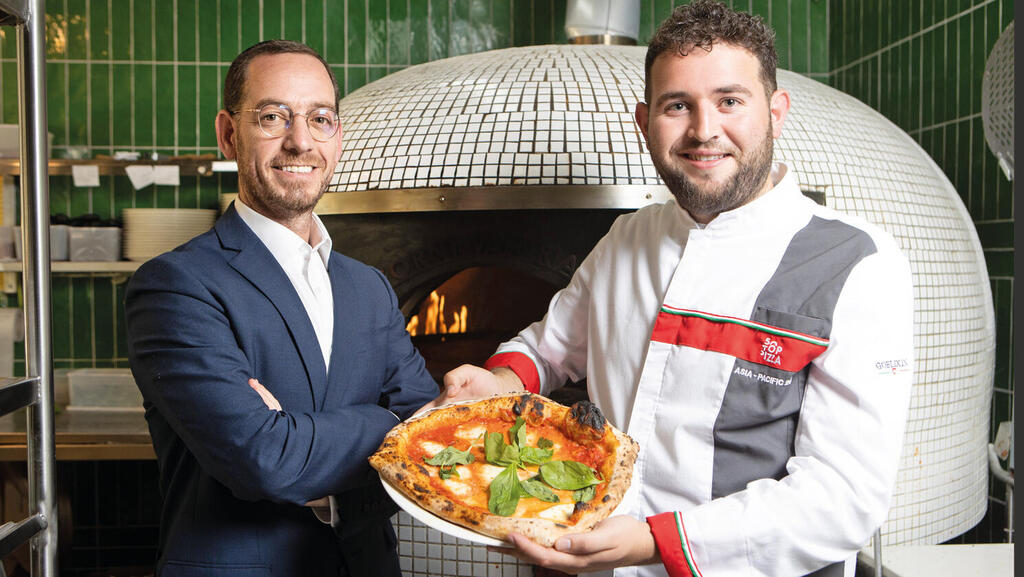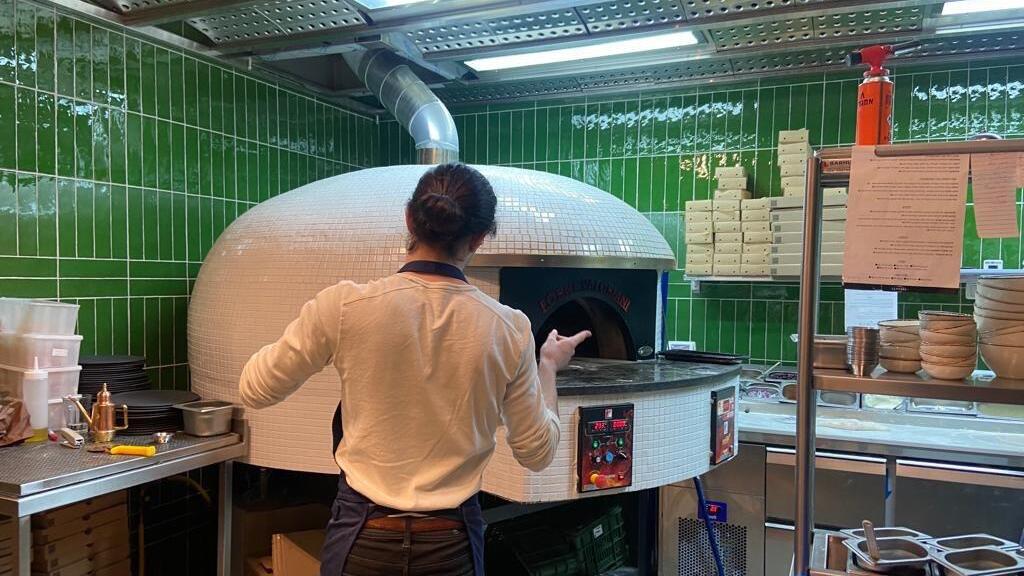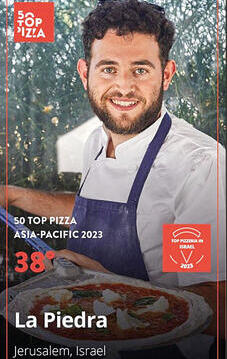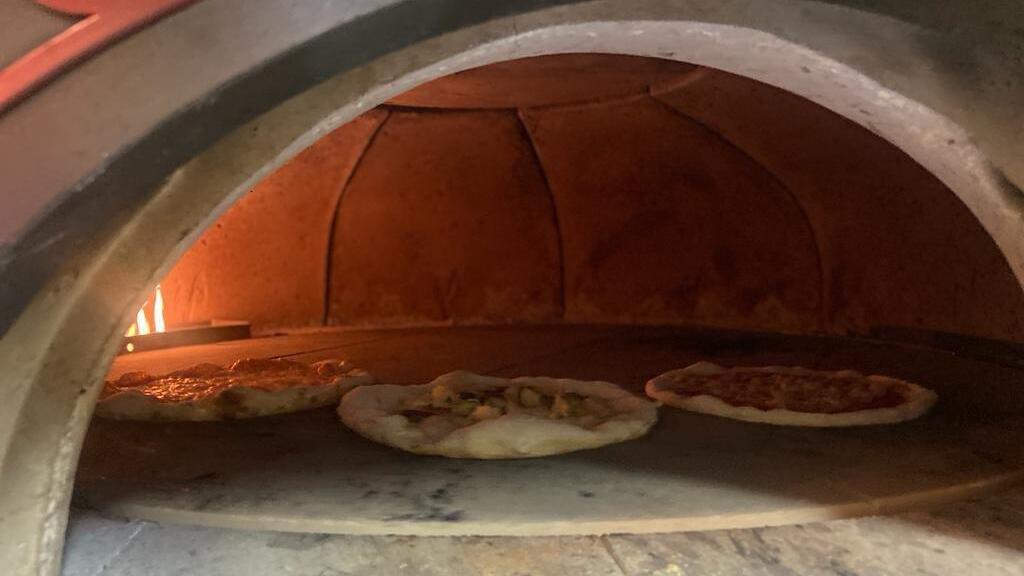They are the recipe for a perfect pizza pie: Yoel Drexler - a 29-year-old yeshiva student and mentor at a youth-at-risk program, and Avi Sinclair - an 18-year-old son of a yeshiva rabbi who dropped out of all religious institutions at the age of 14 and became a rebellious teen, roaming the streets with delinquent friends.
Read more:
Neither of them would have imagined that, 11 years later, they would share one of the great achievements in the Israeli pizzeria scene, In May, the two pizzerias they opened in Jerusalem ranked 38th place on the list of the 50 best pizzerias in Asia and the Pacific region, according to the prestigious Italian magazine "Top 50 Pizza" – the Michelin guide to pizzas. Both pizzerias, named "La Piedra," are certified as kosher.
4 View gallery


Yoel Drexler and Avi Sinclair are the proprietors of two award-winning pizzerias in Jerusalem
We met to learn a bit about the culinary and business success of the duo, who today claim to be on the verge of expansion in Israel and abroad. Yoel, 40, a father of seven with an eighth on the way, seems like someone who jumped straight out of a yeshiva study session to a casual chat during the lunch break. Avi, 29, with tousled hair and a gray t-shirt, and without a kippah, identifies himself as Torah observant in his own way. Despite the differences between them, there is a noticeable harmony in the air.
Yoel, how would you have reacted if you knew when you met Avi that you two would be partners and reach such impressive heights together?
"It would have seemed completely imaginary to me. We started from scratch. Avi had no professional experience in kitchens, and I had never run a serious business or employed workers. The first store we rented stood empty for half a year before we took it over and, before that, it had a high turnover of renters, and everyone said it was an unlucky location. All the odds were stacked against us to fail. But I had great belief in him and the product, even though when we first met there wasn't much separating him from going to jail. He was not part of any formal institutions and had a lot of problematic friends."
How did you find out about the award?
"On Purim, the manager of our restaurant called me and said that someone who spoke English with an Italian accent left a message for us to call back. I thought it was some kind of Purim joke and ignored it. After a week, another message came. When I called back, it turned out to be a representative of the Italian magazine, inviting us to Tokyo for the award ceremony on May 30, and he emphasized that from the moment we spoke we were committed to keeping it confidential."
In order to attend the ceremony, Avi had to miss his sister's wedding in Jerusalem - "I saw the wedding on Zoom," he says.
Some say that it's just a list of the 50 best pizzerias in Asia – not in Europe or North America.
The two men smile. "Asia today in the culinary world is not what it used to be. It is no less important than Europe. Japan, China, Australia, New Zealand, Singapore – there are hundreds of thousands, maybe millions of pizzerias. And it's not bad to get a stamp that you are one of the top 50 among them."
Elton John's contribution to the story
Avi's parents, born in the neighborhood of Arzei Habira in Jerusalem, chose to become religious later in their lives. "My father immigrated from England in 1987. He was called John Sinclair back then, and he left behind a long career in the music world. He established a recording studio in Britain, where Elton John and Robbie Williams were among those who recorded with him. He was also a successful musical producer and, among other things, produced the soundtracks of the "Rocky Horror Picture Show" and the first albums of the band Foreigner, made a lot of money, and started to ask himself if that was all there is to life.
"A book called 'The Shell' that he read, about a Jew returning to his roots, inspired him to learn about Judaism. In Israel, he was ordained as a rabbi. My mother, who came from Buenos Aires and knew nothing about Judaism except for the fact that she was Jewish, also became religious. They got married, and both of them teach and spread Judaism in Israel and around the world. We are 10 children, two sons and eight daughters, four of whom are married. My brothers and two of my brothers-in-law are yeshiva students, and two others work. My father, 74 , finds a way to connect his artistic creation to his world today."
Avi's wife, Kim, is a convert who today observes mitzvot meticulously. "She used to work for us," Avi recounted. "She came to Israel from Venezuela with an Israeli guy from a religious background who questioned his faith, and married him in Cyprus. She didn't even know Hebrew. One day, after two years, she told me that they were about to get divorced. She always had a place in my heart. I knew she was interested in Judaism. We started to get closer, and she went through a long process of conversion that ended with a long and complicated bureaucratic struggle because her Venezuelan passport had expired, and the process of renewal was particularly challenging. We got married a year ago, and now we are expecting a child. She cannot work without a visa, although they allowed her to stay in the country. I myself observe most of the Torah, keep Shabbat, and study with a chavruta twice a week. At home, I wear a kippah and keep kosher."
How is your relationship with your father, the rabbi?
"In the past, we had many conflicts, but today we are close. He saw that I know how to make something of my life, and he calmed down."
Following a simple question about his education, another surprising chapter in Avi's life was revealed. "I didn't attend any school after 8th grade. I was sent to a yeshiva in France for the misfits of the ultra-Orthodox society. Among those with me, there are stories of successful rehabilitation, but also known Israeli criminals. After two and a half months, the cook there resigned, and I entered the kitchen to cook. I always connected with food, and there I could learn normally. On one hand, I was someone who didn't accept institutional authority, and on the other hand I was self-taught. At the age of 16, I returned to Israel, and after a few months, I joined Yeshivat Rashi in Jerusalem." There, he met Yoel, a graduate of the classic ultra-Orthodox track in Jerusalem who arrived at the yeshiva as part of his national service.
Yoel described Avi as a "quiet teenager, marginalized who gave off the vibe of 'I do what I want'."
"At the same time, he was intelligent in a way I had never seen before. In every subject we discussed, he taught me. Food, economics, philosophy. He also weighed 135 kg (298 pounds), and I saw that it bothered him."
His mother encouraged him to undergo lap-band surgery. He was 5 kg away from being eligible for funding from the health fund insurance for the operation, and with Yoel's assistance he embarked on a journey to gain weight. During their constant restaurant visits, which lasted about a month ("the easiest diet I've ever done in my life," Avi quips), they both realized that there was a lack of good kosher pizzerias in Israel. At the age of 19, Avi underwent the surgery and lost 70 kg, going from weighing 140 kgs to 70 kg.
For two years, he constantly went on trips to Naples, Italy, where he roamed between pizzerias and asked to be accepted for voluntary work. There, he learned the secrets of preparing good pizza. In 2016, they opened their first pizzeria on Agron Street in Jerusalem, with an investment of 600,000 shekels, of which 500,000 shekels was a loan from the bank. The name of the place was chosen as a tribute to Argentina, the country of his mother's origin. "It's a country that loves pizza no less than meat. Some 40% of its residents have Italian roots."
The public discourse is full of criticism toward the Haredi sector, do you experience this?
"Without a doubt, there's something in the atmosphere that bothers all of us. In business, I haven't encountered hostility, not even from customers. On my way to the car, sometimes people make comments at me. We're in the area of protests. Usually, the situation changes after a conversation. There's a distance of unfamiliarity that separates the two worlds. At the end of every conversation, I hear the same sentence: 'You're not like the others.'"
What do you feel when you are associated with the accusation that the ultra-Orthodox are oppressing the state?
"It's a terrible feeling. At the end of the month a lot of money from our business goes to taxes," Yoel explained. "We employ 40 workers, none of whom are Haredi. When we grow according to our plans, the number of our employees will double. Not long ago, I sat in a store next to the pizzeria, and there was a woman there who had a master's degree in law, with her own business, who attacked me – 'You're taking our money.' So, I asked her, 'How much property tax did you pay in 2023?' and I showed her my payment. 'How much VAT did you pay?' We compared, and it turned out that my yearly tax payments of all sorts in 2023 were several times higher than hers. There was a prolonged silence, and finally she said, 'If only everyone was like you.'"
Customers from all over
They purchased an oven from a factory in Italy for a quarter of a million shekels for La Piedra. Avi says that the process of making a quality pizza takes only 60-90 seconds at a very high temperature. He emphasizes that if a local pizzeria takes 10 minutes to prepare your pizza, it's a sign that they don't use high-quality cheese.
Your pizza prices range from 60 shekels to 82 shekes for a 32 cm diameter pizza. In the ultra-Orthodox neighborhood pizzerias, you can find a large family pizza for 20 shekels to 25 shekels.
Avi explains that the low-cost neighborhood pizzerias cater to a different audience, providing affordable dinner options for children. He said that such a comparison is like "comparing a hot dog or a pre-made schnitzel to a quality steak."
The ingredients used at La Piedra are of high quality, like imported flour from Campania, Italy, and San Marzano tomatoes, which are carefully grown on the slopes of Mount Vesuvius in Naples and flown in to maintain freshness. Even their cheese costs between 70 shekels and 90 shekels per kilogram.
They offer 14 different pizza types, most of which Avi invented himself, including the "Milk and Honey Pizza" – a combination of goat cheeses and honey, and the "Outrageous" – a dessert pizza made with pizza dough topped with house-made chocolate, cream and caramelized bananas. It's extremely popular. They have clear role divisions – Avi is responsible for the culinary side and the operation of the place, while Yoel handles finances, banks, suppliers and contracts.
The opening of their third pizzeria, a food truck, is scheduled to be on September 1 at Har Hotzvim. They will also open a second food truck with a new chain called "Brotus" – which will be kosher as well – in the style of Kentucky Fried Chicken.
Moshe Leon, the mayor of Jerusalem, is one of the regular customers, who else?
"There are plenty. The people who sit here are a combination of all of the Israeli nation. Many come from the attorney's office, employees of the U.S. embassy," said Yoel. "During holidays and summer, wealthy Haredim from abroad visit us, staying at the nearby Waldorf Astoria and luxury apartments."
Now, they want to make a breakthrough. "The vision is to establish a network of kosher premium pizza restaurants in Israel and abroad," Yoel shared. "After winning the competition, we received hundreds of messages from abroad."




